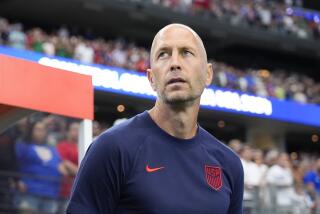Don’t Try to Tell Bilardo About Pressure : Soccer: Argentina’s coach heard from just about everyone in his country during the World Cup. So he quit.
- Share via
When then-President Richard Nixon telephoned the Washington Redskins’ locker room at halftime of a game during the 1972 season and suggested to Coach George Allen that he put in a certain play, Allen listened and obeyed. Nixon similarly offered a pass play to Miami Dolphin Coach Don Shula that same season. The fact that neither play gained yardage was not the point.
Such high-level meddling comes as no surprise in sports. After all, politicians in Washington often evidence more passion for the Redskins than they do for government.
Much the same is true on the world soccer scene, especially in South America. Thus it came as no surprise to Carlos Bilardo, coach of Argentina’s World Cup team, that a day after his team’s opening loss to Cameroon, politicians in Argentina were on the phone to Italy, eager to dispense advice/orders.
Bilardo, who coached the world all-stars in a 2-2 exhibition tie Tuesday night at the Coliseum against an all-star team from Mexico, says now that he devised a way to avoid the second-guessing and criticism common to World Cup coaches. He quit.
Bilardo stepped down last month as the coach of Argentina’s national team after eight years, a period that included winning soccer’s world championship in 1986 and finishing as runner-up to West Germany this year. His phone has not stopped ringing, but now the calls are from soccer clubs offering employment, not politicians with plays,
“After the first game, everyone called me to tell me what to do,” Bilardo said. “I heard from the President, two former Presidents and the opposition leader. There is no question that in countries where there is a strong football tradition, there is pressure on the coach of the national team. We all accept that, and the pressure from the people of my country.”
Bilardo wouldn’t go so far as to say his job was the most pressure-filled in all of Argentina, but when Argentine President Carlos Saul Menem called to suggest lineup changes, Bilardo made the changes. He also heard from former President Raul Alfonsin, who offered “suggestions.”
To Bilardo, it was a measure of the level of interest back home, and an indication of the pressure.
“I have never seen anything like it before in my life; the people were unbelievable,” he said. “I have never seen anything to unify the nation like that before. Not politics or music or anything. Everyone was watching and hoping for the team. And when we came home, they were very happy for us. We were proud to have gotten to the final.”
Hindsight has clearly given Bilardo a happier memory of his nation’s fans. In fact, when Argentina’s team left for Italy, few in the country had a high opinion, or expectations, for the defending champions. They were sent off with much sniffing and scoffing. It wasn’t until Argentina beat Brazil in the second round and then Yugoslavia, that Argentina’s fair-weather fans at home began to give the team their full support.
“People have their opinions, that’s OK,” Bilardo said. “We played better as the tournament went on, and the fans got better, too.”
Argentina’s status as a soccer-exporting nation hampered its preparation for the World Cup. Because almost all of the players on the national team play abroad--and those club teams were reluctant to release players early--Bilardo had only 20 days with his full squad. That togetherness didn’t last long. Four players suffered injuries before the World Cup began, including a blister on Diego Maradona’s big toe that held the nation spellbound.
The outlook only darkened as the tournament began. Argentina lost the opening game to Cameroon--a team that would go on to surprise and delight the world, but at that point in the World Cup Cameroon’s victory was more surprise than anything.
After that upset, Argentina played the Soviet Union. A few minutes into that game, Argentine goalkeeper Nery Pumpido suffered a broken leg. His replacement, Sergio Goycochea, became an overnight hero with his fine play. The fans in Argentina were finally won over.
Even though more than a month has passed since the end of the World Cup, Bilardo has not taken time off. He is a doctor, but he has not returned to his practice. After 25 years as a player and coach, he said he’s reluctant to leave the game. He has received several offers to coach in the Italian first division, including one from a club in Naples that would reunite him with Maradona.
There have also been offers to write a book, star in a film and, interestingly, enter politics.
“I’m looking at it,” he said. “Who knows?”







